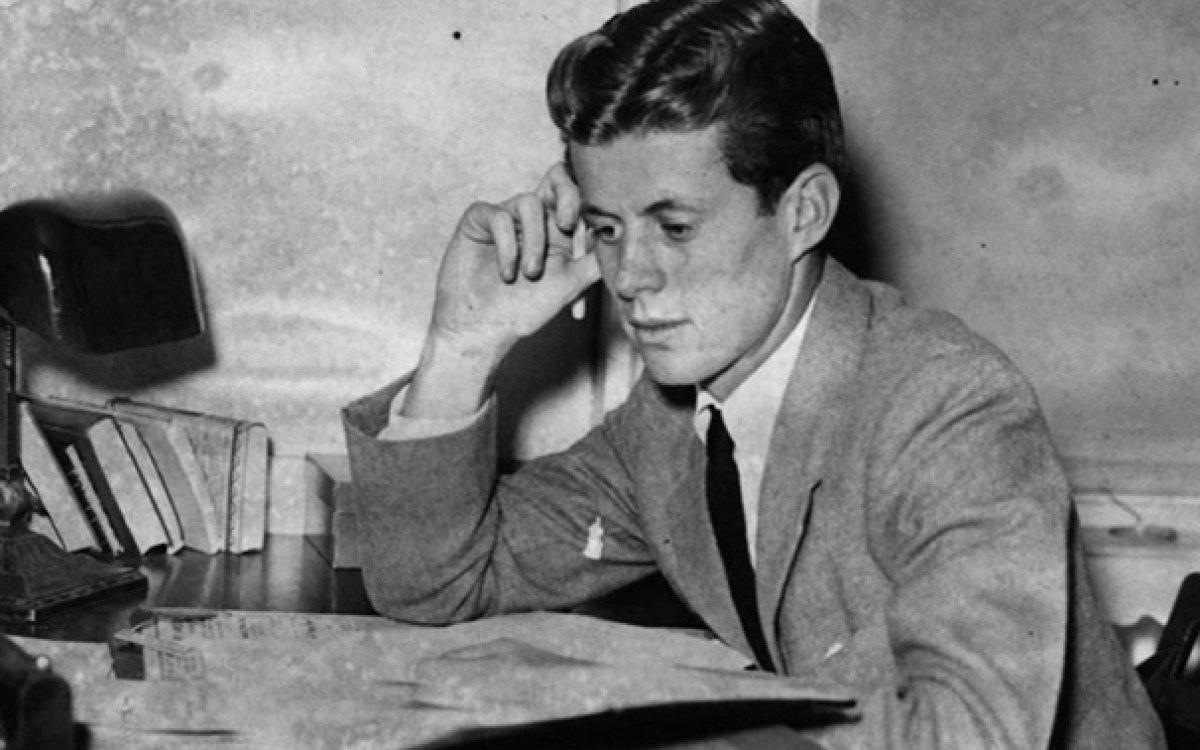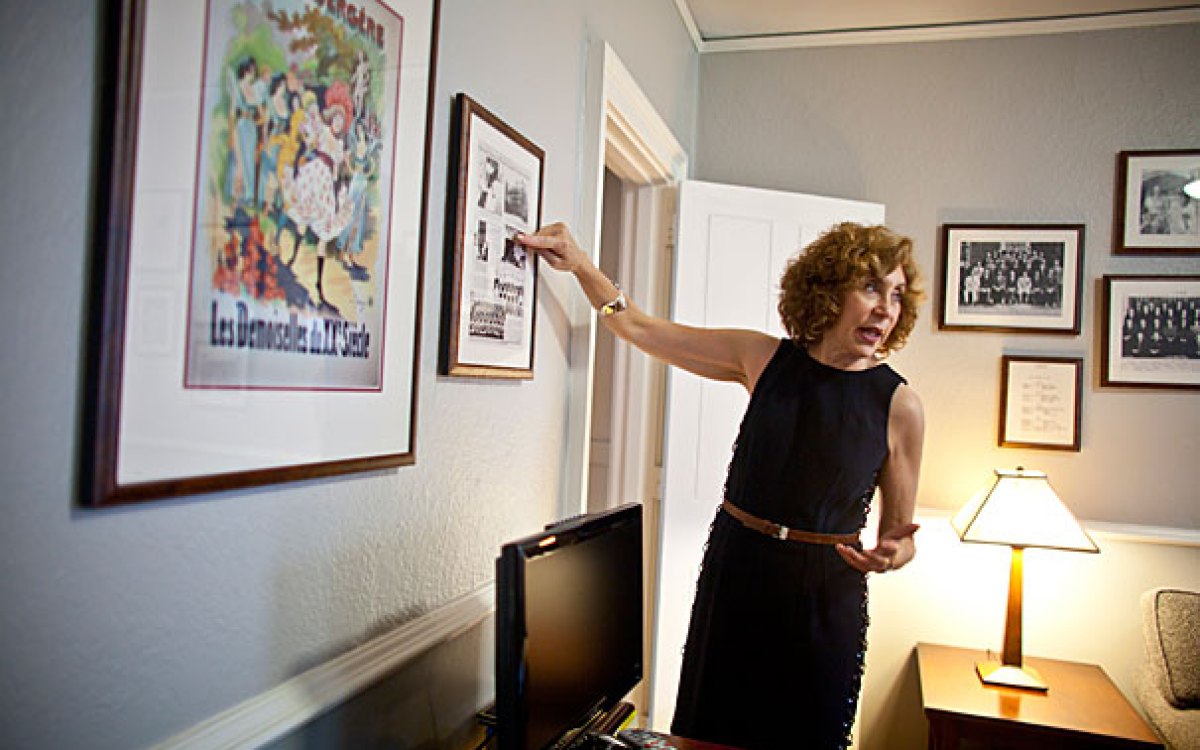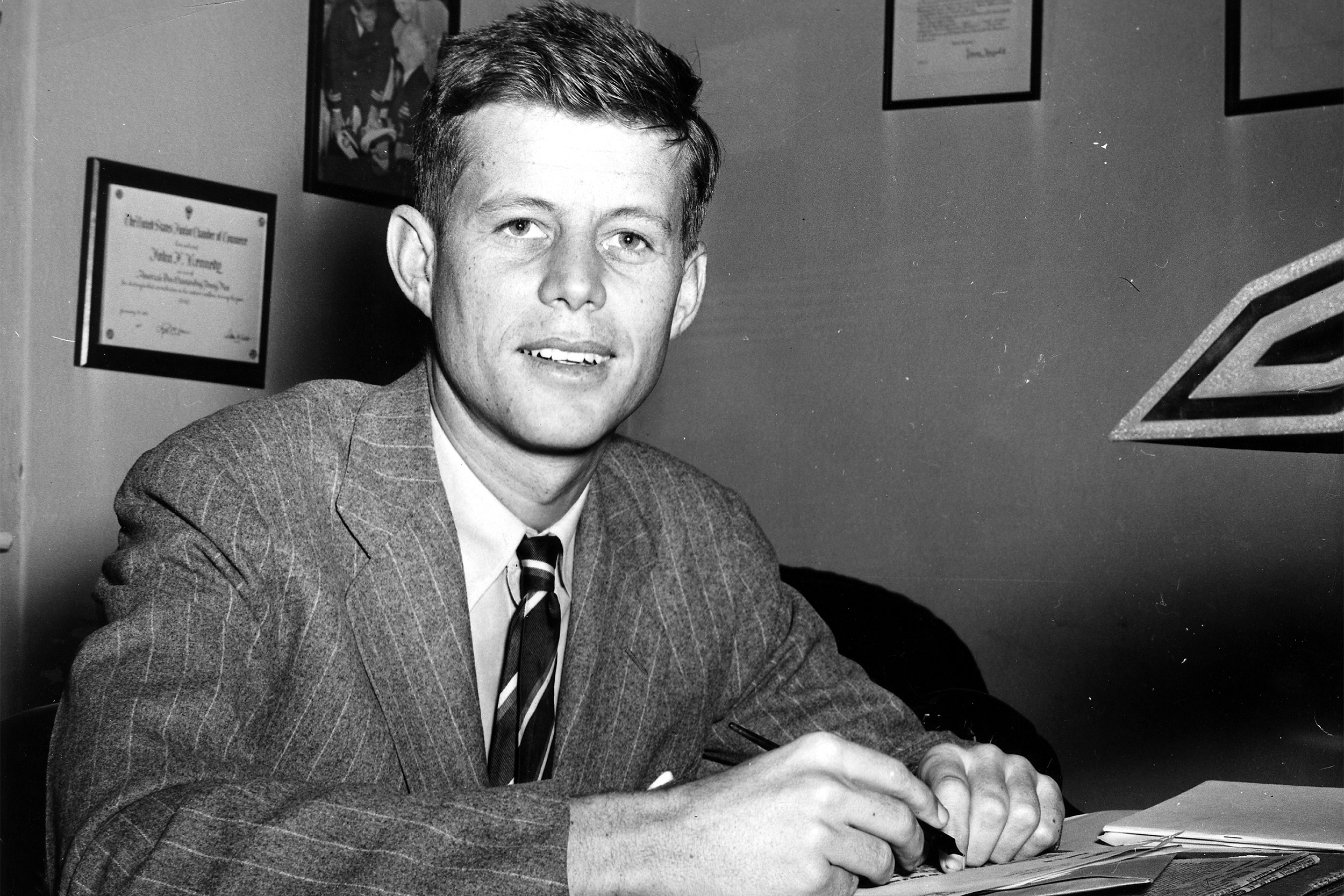
Congressman John Fitzgerald Kennedy (circa 1946-47) in his Congressional Office.
Courtesy of John F. Kennedy Presidential Library and Museum, Boston
A portrait of JFK, in full
New biography aims to chronicle a complex life amid a pivotal time for a nation
One of the revelations about John F. Kennedy in Fredrik Logevall’s new biography, “JFK: Coming of Age in the American Century, 1917‒1956,” is that the man was an excellent letter-writer and diarist. The Laurence D. Belfer Professor of International Affairs at the Harvard Kennedy School and professor of history makes effective use of the collection at the John F. Kennedy Presidential Library, part of which has become available only recently.
“He always had a knack for the English language, even if he was an indifferent student in prep school and in his first years at Harvard,” Logevall says. “His teachers, frustrated by his lack of application overall, were always impressed by his way with words. It is an interesting contrast with his older brother, Joe Jr., the family’s supposed golden child, whose writings had a more dutiful, less imaginative quality.”
The first of a two-volume set, “JFK” aims to give the clearest picture yet available of the 35th president set against the historical, political, and cultural context of a pivotal age. The book begins with great-grandfather Patrick Kennedy’s arrival in Boston during the Irish potato famine and runs through Jack’s childhood, studies at Harvard, and military duty, and finally his rise in politics in 1956, when he almost became the Democrats’ vice presidential pick. Logevall spoke with the Gazette recently about the man and the book.
Q&A
Fredrik Logevall
GAZETTE: There have certainly been many books written about JFK. What were you able to find that hadn’t been found before?
LOGEVALL: You’re quite right. There are a lot of excellent books out there on various aspects of his life and career, and especially the presidency — one thinks, for example, about the many studies of the Cuban missile crisis, Civil Rights, the Bay of Pigs disaster, the marriage with Jackie, and the assassination in Dallas. But we don’t have many true biographies, even one that is a full-scale examination of the entire life and that looks closely at his early life, in particular his teens and 20s, which I believe were key years for him (as they are for most of us). Mine is a “life and times” biography that places Kennedy in his own context, that of a rising American power in world affairs. I guess the conceit of the book is that I can tell two stories together: the story of John F. Kennedy’s rise and the story of America’s rise. I believe we can better understand the first half of the so-called American Century through the lens of Kennedy’s life.
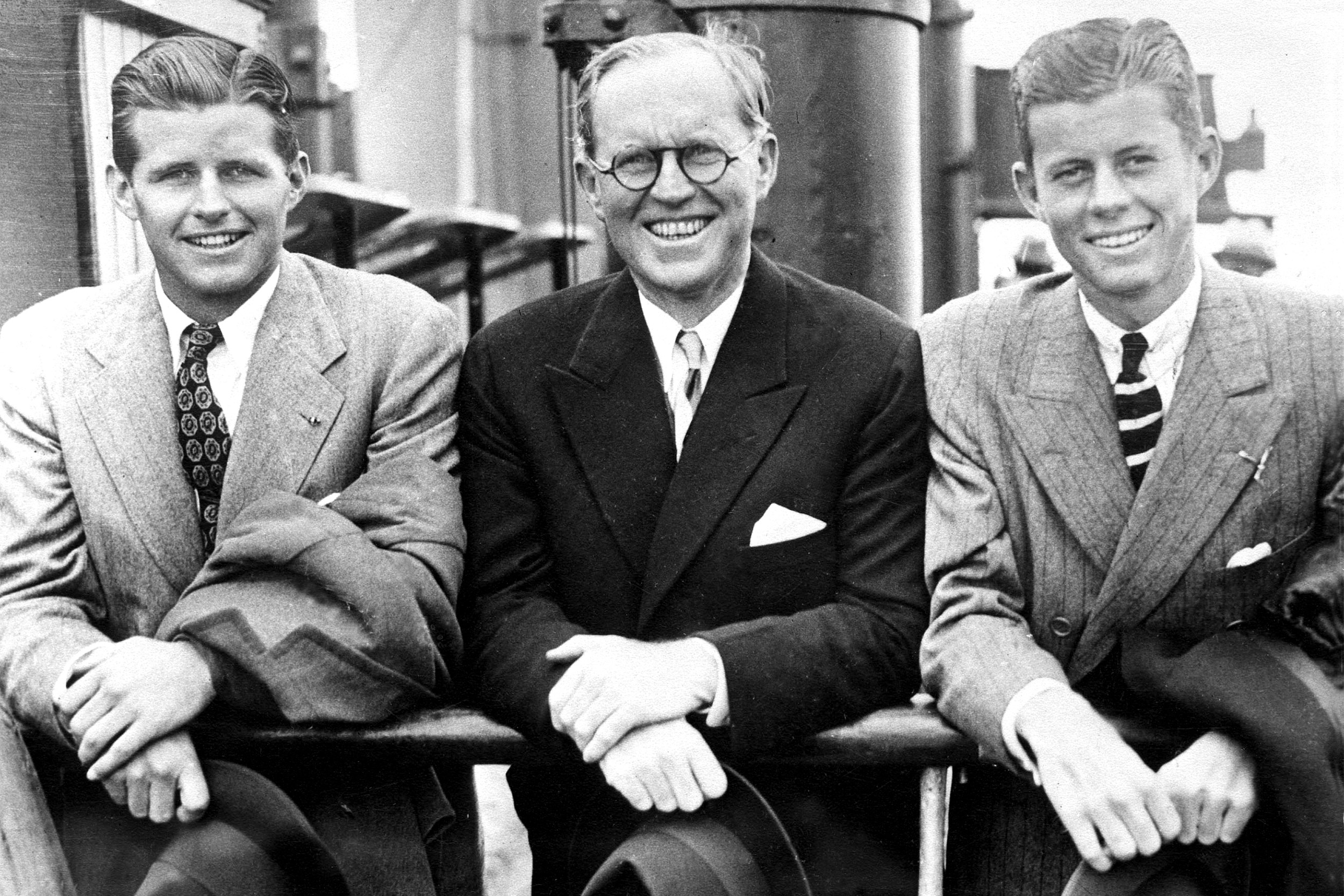
Joseph P. Kennedy Jr. (from left), Joseph P. Kennedy Sr., and John F. Kennedy in Southampton, England, July 2, 1938.
Courtesy of John F. Kennedy Presidential Library and Museum
GAZETTE: What did you find that people have missed about JFK in the past?
LOGEVALL: One thing that people have underplayed is the degree to which he was a serious student of democracy and world affairs at an earlier point than we imagine. We tend to think of him as a callow playboy, not serious about public policy or his career until quite late, until he runs for Congress in 1946, and maybe not even then. But you can look at the papers he wrote as an undergraduate at Harvard, some of which are available, and you can look at his senior thesis which became a best-selling book [“Why England Slept”] and see a young man already thinking deeply and in sustained fashion about important issues. A second finding is that the young Jack Kennedy was in important respects his own master. Though his father was a towering force in his life and those of his eight siblings, Jack proved willing and able, to a degree I did not expect, to chart his own course. The Harvard years are interesting in this regard: In 1939‒40, as World War II began and debate raged in the U.S. about how to respond, Jack showed himself willing in a way his older brother, Joe Jr., never was to separate himself from his father. Long before Pearl Harbor, Jack had become an interventionist while his father adhered throughout to a staunch isolationist position. Later, during his political campaigns, Jack always kept the key decision-making role for himself, notwithstanding the common misconception that his father called the shots.
[gz_soundcloud title=”John F. Kennedy recording for public speaking class at Harvard, 1937″ track_id=”321147626″ playlists=”” height=”350″ show_artwork=”false”] [/gz_soundcloud]
GAZETTE: Another family relationship we learn more about is with his brother Bobby, and how this became increasingly important.
LOGEVALL: Yes, the age difference between the two brothers was such — 8½ years — that in the early years, when Jack was at prep school and then at Harvard, they weren’t particularly close. But what we see especially in 1951, when they traveled together along with their sister Patricia on an extended tour of the Middle East and Asia, is that they developed a strong bond. Bobby admired his brother to no end, and Jack could now see Bobby’s intelligence and loyalty and good cheer. Then in 1952 Bobby, all of 26 at the time, came aboard to take charge of Jack’s floundering Senate campaign against Henry Cabot Lodge and helped to turn the thing around. Jack could now see just how important Bobby could be to his career, could see the powerful combination of doggedness, shrewdness, and ruthlessness that his brother possessed.
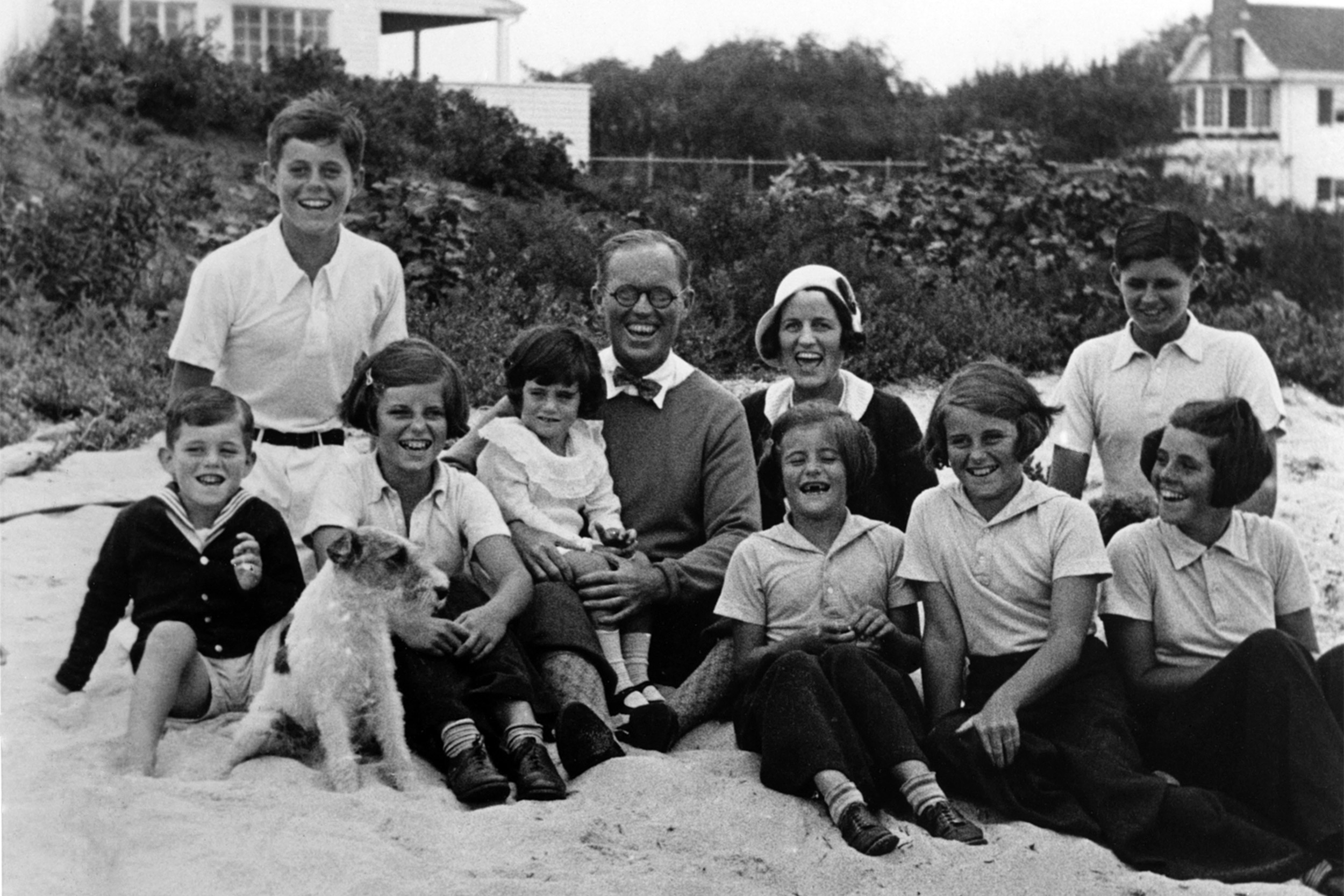
The Kennedy family at Hyannisport, Mass., 1931. Robert (from left), John, Eunice, Jean (on lap of) Joseph P. Kennedy Sr., Rose Fitzgerald Kennedy (behind) Patricia, Kathleen, Joseph, Rosemary.
Photo by Richard Sears, courtesy of the John F. Kennedy Presidential Library and Museum
GAZETTE: He was quite a complex character. He did have his playboy side, but some of his war actions can be called heroic.
LOGEVALL: Yeah, I think that is right. There is a seriousness of purpose which you see in his letters home from the South Pacific, and more dramatically in the actions he took to help save his crew after his boat, the PT-109, was rammed by a Japanese destroyer. Was there heroism there? I believe so, even if he deserves no accolades for allowing his boat to be rammed. The efforts he made in the succeeding days to try to save his crew were really quite extraordinary. We might note here as well that he came back from the war, as many of the servicemen did, with a seriousness of purpose evinced to some degree before but deepened as a result of seeing combat. He was convinced that the U.S. would need to play a leading role in world affairs, even as he also had a skepticism about the use of the military’s power that he would carry with him for the rest of his days.
GAZETTE: His coming out against Joseph McCarthy seems to be a bit of a political turning point.
LOGEVALL: Well, he never fully came out in stark opposition, which was a problem. The relationship with McCarthy was complicated, partly because of family ties. He never felt the kind of personal connection to McCarthy that Joe Sr. felt and that Bobby felt. And there were a lot of aspects of McCarthy’s political persona that he found off-putting — the disdain for senatorial good manners, the disregard for facts, for reasoning from evidence. That said, liberals at the time had good reason to be frustrated by JFK’s reluctance to really condemn McCarthy. Even in 1954, when McCarthy’s influence was in decline and the Senate held a censure vote, JFK, recovering in the hospital following a serious surgery, did not instruct his aide Ted Sorensen to register his position on the vote. He could have done so, but he didn’t, and that caused a lot of grief for him with liberals later on. He preferred to sidestep the issue, aware that there were an awful lot of Irish Catholic voters in Massachusetts who still backed McCarthy. He didn’t want to get on their bad side.
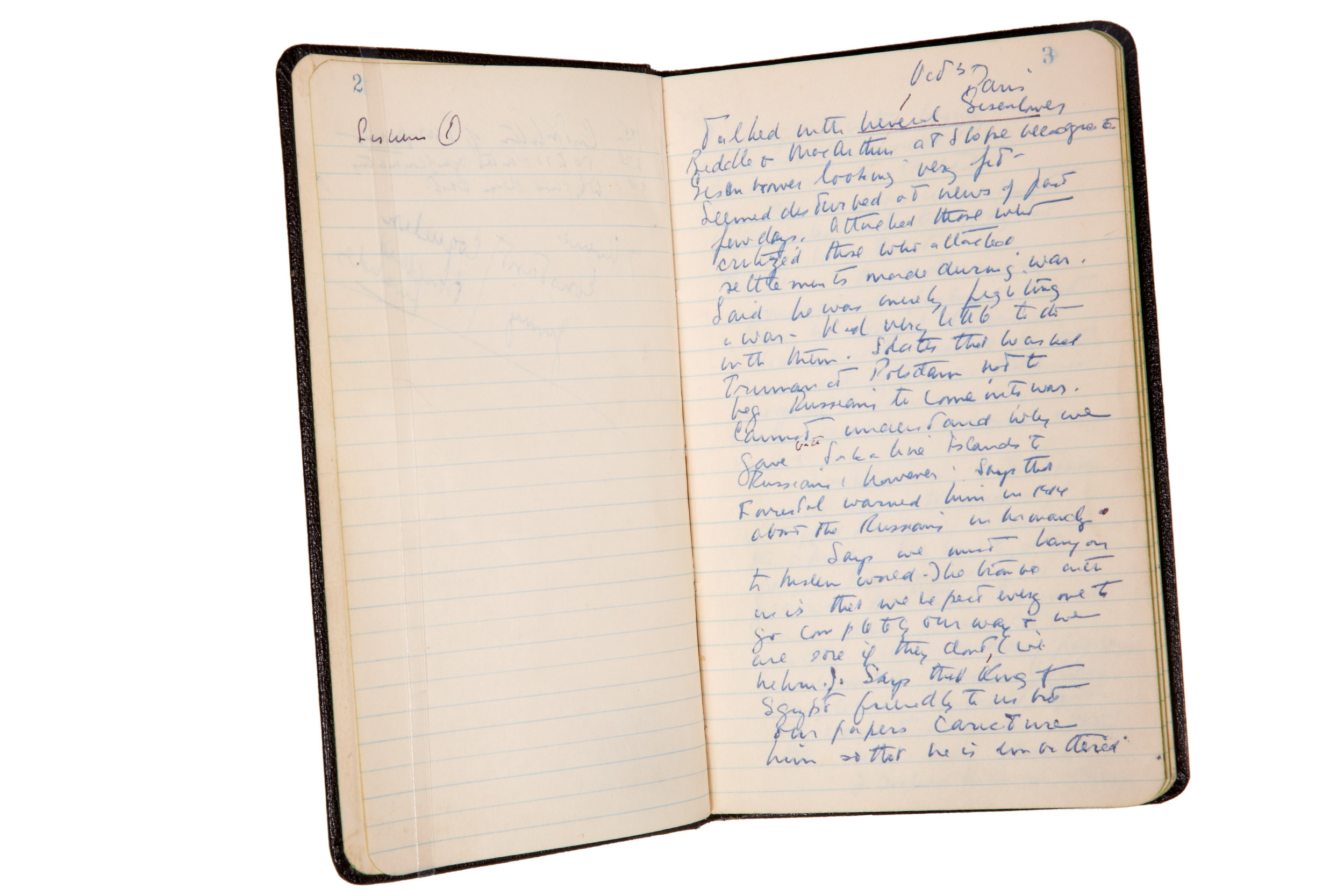
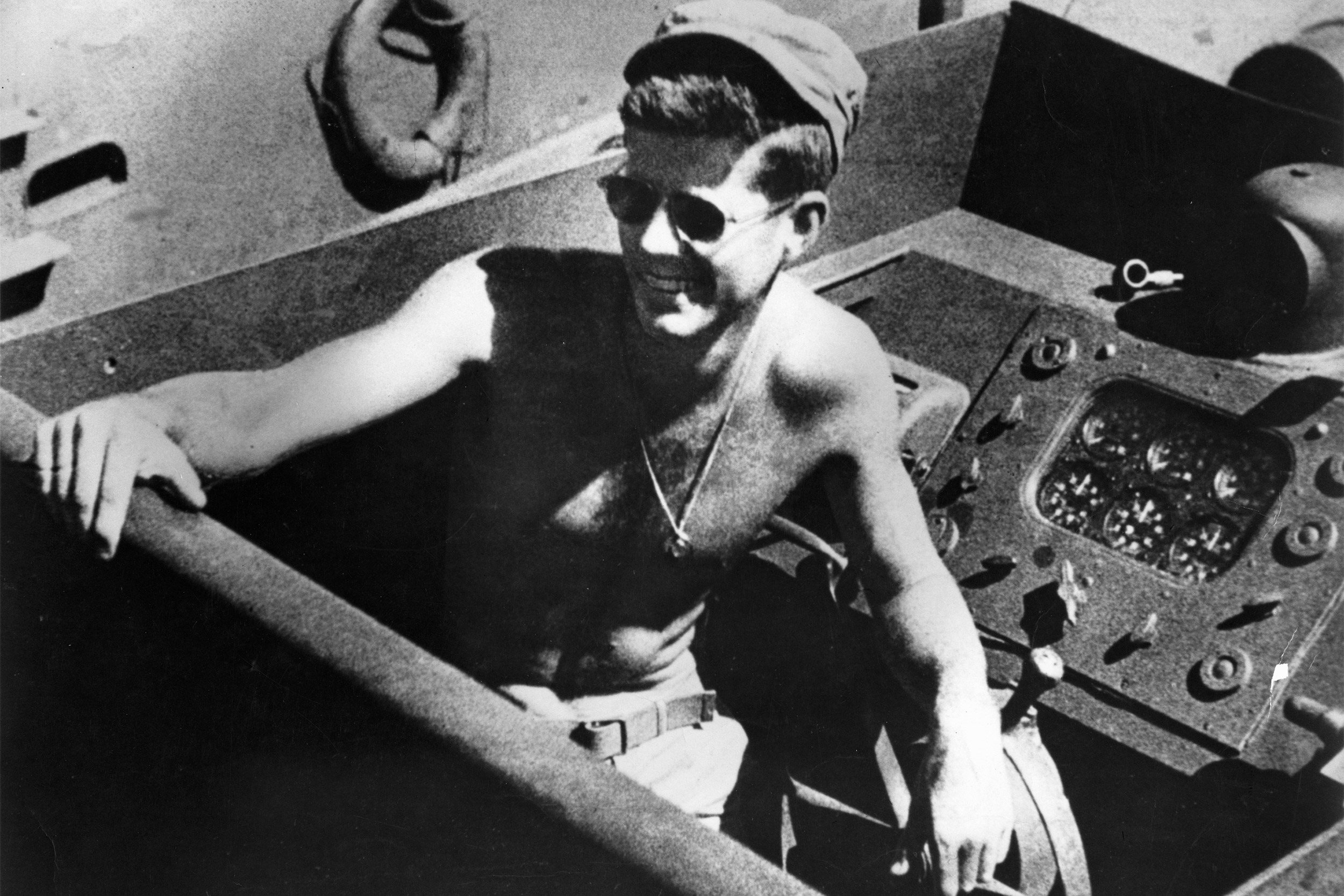
A page in Kennedy’s diary from fall 1951. The first part reads: “Oct. 3 — Paris — I talked with General Eisenhower Biddle and MacArthur at SHAEF Headquarters. Eisenhower looking very fit — seemed disturbed at news of last few days.” Lt. Kennedy on board PT 109, July 1943.
Photo by Joel Benjamin (left), courtesy of the John F. Kennedy Presidential Library and Museum
GAZETTE: The book deals a lot with the influence of World War II on his character development. Do you think he took a lot from other aspects of American life at the time, including popular culture?
LOGEVALL: To a degree, certainly. When he returned from the war and was figuring out what he wanted to do, he had a fascinating stint as a journalist. He showed good reporting instincts and could have made it a career. In this period he also liked to pal around in Hollywood, where his father had been a movie mogul in the 1920s and still had connections. Jack dated actresses like Gene Tierney and liked to be on the set, liked to go to movies. Popular music I think interested him less, and until Jackie came along he evinced little interest in art. He did like poetry, and he memorized a lot of it starting already in prep school at Choate. But the Hollywood connection is interesting to me, and probably plays some role in his later skill at using images and film to advance his political career. He was among the first politicians to see that images matter, that the right use of film can make a powerful difference. Television was a huge emerging thing as his career builds, and he had that savvy understanding of the medium and how he could use it to his advantage, kind of like FDR used radio so effectively.
GAZETTE: Many of the reviews I’ve read have focused on his womanizing, which we already knew about. Do you think that’s ultimately that important a part of his character?
LOGEVALL: Yes, the womanizing is an important part of who he is. His father led by example, carrying on with innumerable women in the 1920s and 1930s, and the older kids knew very well what was going on. Joe Sr. made clear he expected his sons to follow his ways. But I can’t have it both ways: If I’m going to argue that JFK was able to resist his father’s pressure and be his own man when it came to politics and career choices, I have to maintain that he could have broken with him on this issue too. Here he was his father’s son, with a tendency to see women as objects to be conquered. But there are paradoxes here, among them the fact that his administration took important progressive steps, establishing, for example, the President’s Commission on the Status of Women, with Eleanor Roosevelt as chair. In 1962, at the urging of the commission, Kennedy ordered federal agencies to cease sex discrimination in hiring.
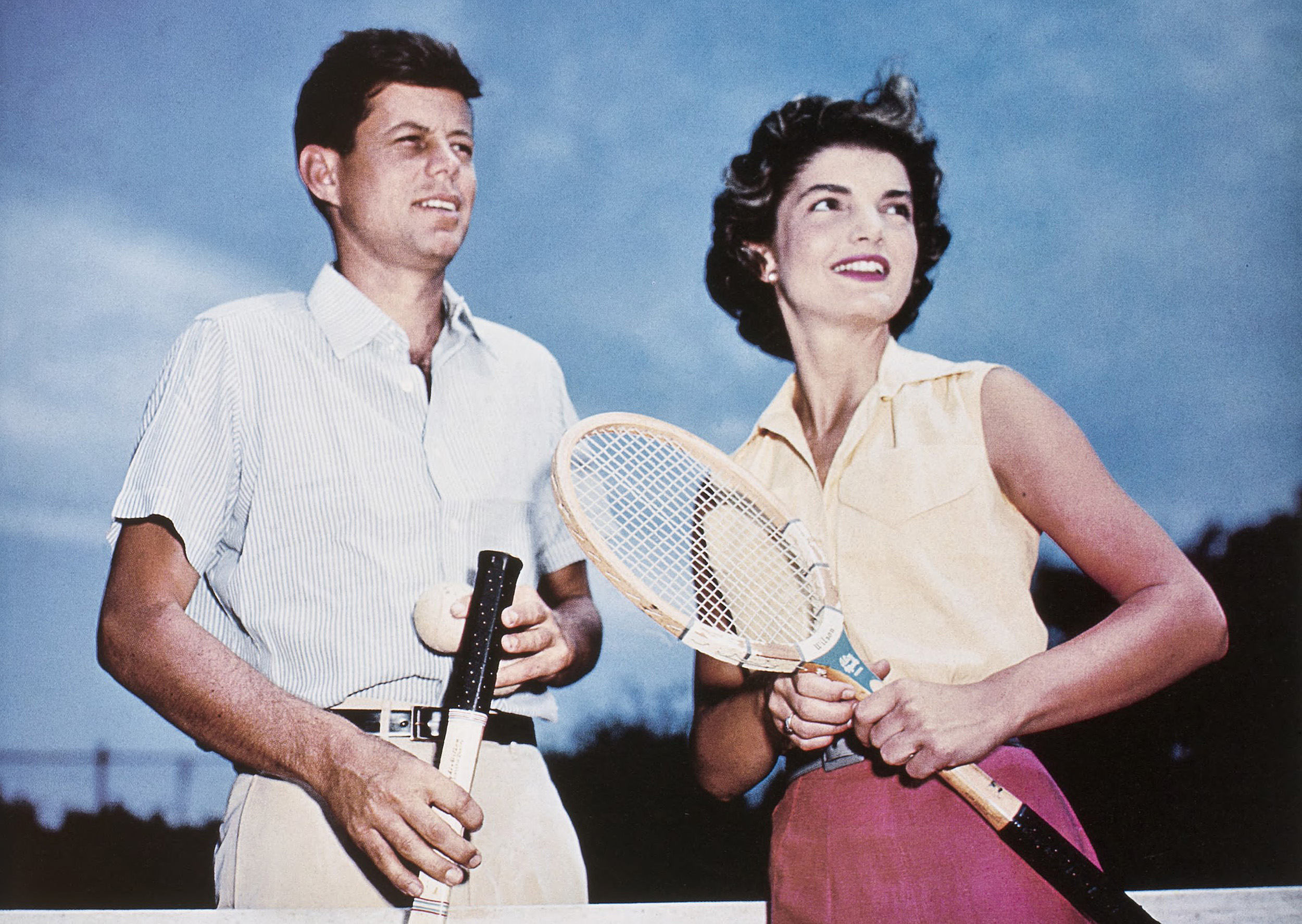
Sen. John Kennedy and his then-fiancée Jacqueline Bouvier in Hyannis Port, Mass.
Photo courtesy of Harvard Fine Arts Library, Digital Images & Slides Collection
GAZETTE: In the second volume you’ll have to unravel the mystery around the assassination. Do you have a sense of how you will approach that?
LOGEVALL: There is certainly a fascination, and it shows few signs of fading. It is a vexing issue to any biographer of JFK, and it has spawned a whole cottage industry of its own. I haven’t yet written Volume 2 so I haven’t fully decided how I will proceed on this. But certainly I will talk about Lee Harvey Oswald’s background, about what led him to take this action, and will give the reader a full sense of how it all culminated in this terrible moment. And I think I will owe the reader my assessment of what I believe happened. So I will provide it. I don’t think I will get heavily into the deliberations of the Warren Commission or the various conspiracy theories that have sprouted up over the years. That’s another book, not to mention a potential morass.
GAZETTE: What do you think happened?
LOGEVALL: My reading of the evidence we have indicates pretty clearly to me that Oswald was the lone gunman. Claims to the contrary all come up short. Oswald’s associations and meetings in the weeks leading up to the assassination are worthy of investigation, however, and have been examined in recent studies. I will delve into that material and be interested to see what I find.
Interview was lightly edited for clarity and length.



